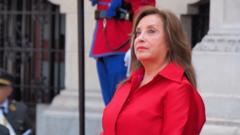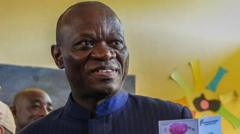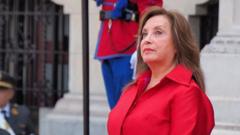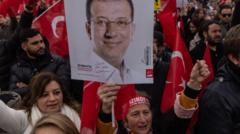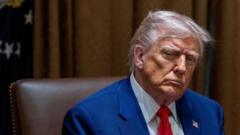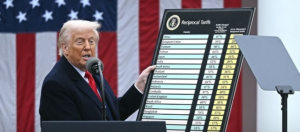In a critical address to the nation, South Korean President Yoon Suk Yeol expressed regret for declaring martial law, acknowledging it caused widespread public anxiety. Despite growing calls for his resignation, he refrained from stepping down, deferring his fate to his party while facing an imminent impeachment vote.
**South Korea's President Yoon Apologizes Amid Impeachment Controversy**

**South Korea's President Yoon Apologizes Amid Impeachment Controversy**
President Yoon Suk Yeol holds a press conference to address the nation's turmoil following his martial law declaration, while facing impending impeachment.
President Yoon Suk Yeol of South Korea addressed the nation on Saturday, delivering a heartfelt apology for the martial law declaration earlier this week that sparked considerable protests and deepened political unrest. In a televised speech, Yoon expressed his regret for having caused "anxiety and discomfort" among the South Korean public and bowed his head in a gesture of remorse. However, despite increasing pressure from various sectors to resign, he emphasized that he would leave discussions regarding his future leadership to his party.
The president's address, lasting just over two minutes, followed days of political isolation after rescinding the controversial martial law decree, which had lasted less than six hours. Lawmakers were set to vote on an impeachment motion that evening, and analysts suggested that the measure could pass if at least eight of Yoon's own party members supported it, joining the opposition.
During his speech, Yoon pledged to take full legal and political responsibility for his actions and ruled out any potential future impositions of martial law, which was initially declared out of "desperation" in response to government gridlock. His remarks came amid escalating public outcry, with labor unions, opposition groups and civil organizations planning demonstrations against him on the same day.
Yoon's party leader, Han Dong-hoon, publicly indicated that Yoon's resignation now appeared inevitable, asserting it was impossible for the president to effectively fulfill his duties given the growing dissent. Opposition leader Lee Jae-myung of the Democratic Party criticized the president's speech as inadequate, further intensifying demands for his resignation or impeachment.
During the tumultuous lead-up to this vote, important political dynamics have shifted. A broad spectrum of South Koreans has expressed dissatisfaction with Yoon's handling of both the political crisis and the economy, which is facing additional pressures from international market changes. The opposition is steadfast in their resolve to pursue impeachment proceedings, citing his actions as unconstitutional.
As the political climate in South Korea hangs in the balance, future developments around the impeachment vote remain critical for the country's democracy and governance.









